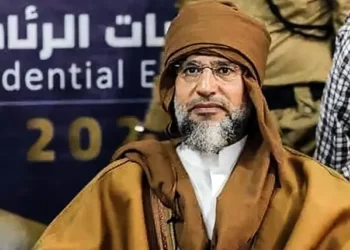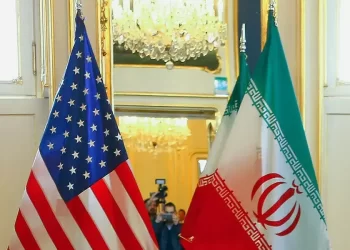PARIS (news agencies) — Alain Delon, the internationally acclaimed French actor who embodied both the bad guy and the policeman and made hearts throb around the world, died at age 88, French media reported.
With his handsome looks and tender manner, the prolific actor was able to combine toughness with an appealing, vulnerable quality that made him one of France’s memorable leading men.
Delon was also a producer, appeared in plays and, in later years, in television movies.
French president Emmanuel Macron paid tribute on X to “a French monument.”
“Alain Delon has played legendary roles and made the world dream,” he wrote. “Melancholic, popular, secretive, he was more than a star.”
Delon’s children announced the death on Sunday in a statement to French national news agency Agence France-Presse, a common practice in France. Tributes to Delon immediately started pouring in on social platforms, and all leading French media switched to full-fledged coverage of his rich career.
Earlier this year, his son Anthony had said his father had been been diagnosed with B-cell lymphoma, a type of cancer.
Over the past year, Delon’s fragile health condition had been at the heart of a family dispute over his care that gave rise to bitter exchanges through the media among his three children.
At the prime of his career, in the 1960s and 1970s, Delon was sought out by some of the world’s top directors, from Luchino Visconti to Joseph Losey.
In his later years, Delon grew disillusioned with the movie industry, saying that money had killed the dream. “Money, commerce and television have wrecked the dream machine,” he wrote in a 2003 edition of newsweekly Le Nouvel Observateur. “My cinema is dead. And me, too.”
But he continued to work frequently, appearing in several TV movies in his 70s.
Delon’s presence was unforgettable, whether playing morally depraved heroes or romantic leading men. He first drew acclaim in 1960 with “Plein Soleil,” directed by Réne Clément, in which he played a murderer trying to take on the identity of his victims.
He made several Italian movies, working, most notably with Visconti in the 1961 film “Rocco and His Brothers,” in which Delon portrays a self-sacrificing brother intent on helping his sibling. The movie won the Special Jury Prize at the Venice Film Festival.
The 1963 Visconti film “Le Guepard” (The Leopard) starring Delon won the Palme d’Or, the highest honor at the Cannes Film Festival. His other films included Clément’s “Is Paris Burning,” with a screenplay by Gore Vidal and Francis Ford Coppola among others; “La Piscine” (The Sinners), directed by Jacques Deray; and, in a departure, Losey’s “The Assassination of Trotsky” in 1972.
In 1968, Delon began producing movies — 26 of them by 1990 — part of a frenzied and self-assured momentum that he maintained throughout his life.
Delon’s confidence was palpable in his statement to Femme in 1996, ‘I like to be loved the way I love myself!’ This echoed his charismatic screen persona.
Delon continued to captivate audiences for years — on the way courting criticism for comments deemed outdated. In 2010, he appeared in “Un mari de trop” (“One Husband Too Many”) and returned to the stage in 2011 with “An Ordinary Day,” alongside his daughter Anouchka.
He briefly presided over the Miss France jury but stepped down in 2013 after a disagreement over some controversial statements, which included critiques on women, LGBTQIA+ rights, and migrants. Despite these controversies, he received a Palme d’Honneur at the 2019 Cannes Film Festival, a decision that sparked further debate.
The Brigitte Bardot Foundation, dedicated to animal protection, paid tribute to “an exceptional man, an unforgettable artist and a great friend of animals,” in a statement released on social media. Delon was “a close friend” of French film legend Brigitte Bardot “who is deeply saddened by his passing,” the statement said. “We lose a precious friend and a man with a big heart.”
French film producer Alain Terzian said Delon was “the last of the giants.”









